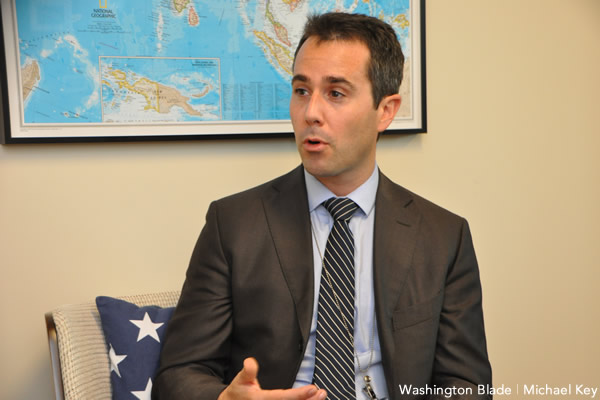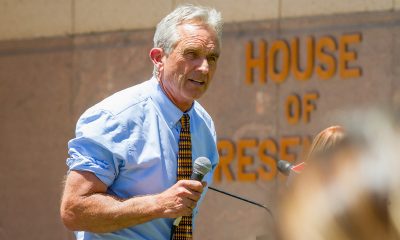News
Gay ambassador in the spotlight amid Ukraine crisis
Baer a ‘strong voice for human rights’ at OSCE as Russia invades


Gay U.S. ambassador Daniel Baer is representing U.S. interests during the Ukraine crisis at the Organization for Security & Cooperation in Europe. (Washington Blade photo by Michael Key)
A gay U.S. ambassador is taking center stage in the crisis over Russia’s military incursion into Ukraine by representing American interests at the Organization for Security & Cooperation in Europe.
Daniel Baer, who was confirmed by the U.S. Senate in August to his seat at the Vienna-based international conference, has his work cut out for him in one of the most daunting foreign policy challenges faced by the Obama administration.
As widely reported, after turmoil in Ukraine leading to the ouster of the pro-Russian President Viktor Yanukovych, Russian military forces under the leadership of President Vladimir Putin occupied buildings, airports and other assets in Crimea for what he’s said is ensuring the safety of ethnic Russians living on the peninsula. Both the United States and the Ukraine government have deemed the incursion an act of invasion and occupation by Russian forces.
From his Twitter account, Baer has posted updates about efforts to mitigate the crisis, which include attending emergency meetings to deliver the U.S. call to send an international observer mission to Ukraine.
The OSCE was set up during the Cold War as a forum where the United States could raise human rights and security issues with countries aligned with the Soviet Union. After the Cold War, the OSCE has served as a pan-Atlantic forum now comprising 57 European, Asian and North American countries for conversations on conflict management and human rights, although the most recent crisis in Ukraine recalls the original purpose of the organization.
In his prepared remarks for an initial emergency meeting on Sunday, Baer said Putin is breaking various international agreements by intervening in Crimea, such as its 1994 Budapest Summit commitments that enabled the de-nuclearization of Ukraine.
“The effects on relations between the Russian Federation and every single participating state around this table, to which the Russian Federation has pledged its commitment to abide by principles of sovereignty and territorial integrity, will be profound,” Baer said.
Baer also lists the times Russian diplomats were critical of military incursions in the Middle East, Moldova, Bosnia and Herzegovina and Sri Lanka, saying Russia can’t selectively apply this principle to its foreign policy.
In response, the Russian government insists it has undertaken the incursion into Crimea out of concern for the Russian ethnic minority. But Baer asserts an international monitoring team would be an appropriate way to handle the situation.
“Now just a moment ago we heard from the delegate of the Russian Federation a repeat of their concerns about the protection of Russian citizens, the treatment of minorities, and the security of Russian military installations and personnel in Crimea,” Baer said. “An international monitoring mission is the right way to address these concerns.”
Following the meeting, Baer was photographed speaking with the media as he spoke about the U.S. call for an OSCE-led monitoring mission to Ukraine. According to Reuters, Baer told reporters the United states has won tentative support for a many members for a monitoring mission, including “openness” from the Russian delegation. Moscow has veto power on the OSCE.
.@DanBBaer w/press after #OSCE session today – calling for int’l monitor mission to #Ukraine: http://t.co/y3oCUPOFmA pic.twitter.com/XjJmIw9Nyu
— U.S. Mission to OSCE (@usosce) March 2, 2014
Recently via Twitter, Baer said he’s hearing “worrying” multiple reports that paramilitaries are going house to house in Crimea and issuing threats if residents don’t attend pro-Russia rallies.
It should be noted that Baer is taking a lead role during the Ukraine crisis, but isn’t the top U.S. diplomat handling the situation. Victoria Nuland, assistant secretary of state for European and Eurasian Affairs, was also set to participate in the OSCE meetings along with Baer.
An initial emergency ambassadorial meeting of the 57 OSCE participating states called by the Swiss chairman took place Sunday. Following a special meeting Monday in which Nuland spoke for the United States, Baer said via Twitter yet another meeting was set for Wednesday “in response to Ukraine’s activation of Vienna Document Ch III mechanisms.”
Prior to his assignment as U.S. ambassador to OSCE, Baer was the State Department’s deputy assistant secretary for the Bureau of Democracy, Human Rights & Labor, where he took a lead role in shaping policy for international LGBT affairs. In his new post, Baer has moved to Vienna with his partner Brian Walsh.
Mark Bromley, chair of the Council for Global Equality, said Baer was “a strong and vibrant voice for human rights” at the bureau, so his role in mitigating the Ukraine crisis is reassuring.
“The OSCE was originally created to engage the former Soviet Union on human rights issues, and so it’s fitting that Dan is representing our country there now as we come – once again – to a confrontation with Russia over human rights with a leader who looks increasingly like a Soviet-era dictator,” Bromley said.
Recalling the anti-gay laws — including a controversial law banning anti-gay propaganda to minors — already put in place under Putin’s regime, Bromley said Putin has shown his targets for persecution aren’t limited to his own LGBT citizens.
“It’s important that we have a strong ambassador at the OSCE, and one who, as a gay American, understands that persecution of just one small minority in a country rarely ends with that one group, but, as history has shown repeatedly, almost always ends with a more aggressive assault on the rights of a broader group of people,” Bromley said.

The Mexican Senate on Thursday approved a bill that would ban so-called conversion therapy in the country.
Yaaj México, a Mexican LGBTQ rights group, on X noted the measure passed by a 77-4 vote margin with 15 abstentions. The Chamber of Deputies, the lower house of Mexico’s congress, approved the bill last month that, among other things, would subject conversion therapy practitioners to between two and six years in prison and fines.
The Senate on its X account described conversion therapy as “practices that have incentivized the violation of human rights of the LGBTTTIQ+ community.”
“The Senate moved (to) sanction therapies that impede or annul a person’s orientation or gender identity,” it said. “There are aggravating factors when the practices are done to minors, older adults and people with disabilities.”
Mexico City and the states of Oaxaca, Quintana Roo, Jalisco and Sonora are among the Mexican jurisdictions that have banned the discredited practice.
The Senate in 2022 passed a conversion therapy ban bill, but the House of Deputies did not approve it. It is not immediately clear whether President Andrés Manuel López Obrador supports the ban.
Canada, Brazil, Belgium, Germany, France, and New Zealand are among the countries that ban conversion therapy. Virginia, California, and D.C. are among the U.S. jurisdictions that prohibit the practice for minors.
The White House
Four states to ignore new Title IX rules protecting transgender students
Biden administration last Friday released final regulations

BY ERIN REED | Last Friday, the Biden administration released its final Title IX rules, which include protections for LGBTQ students by clarifying that Title IX forbids discrimination based on sexual orientation and gender identity.
The rule change could have a significant impact as it would supersede bathroom bans and other discriminatory policies that have become increasingly common in Republican states within the U.S.
As of Thursday morning, however, officials in at least four states — Oklahoma, Louisiana, Florida, and South Carolina — have directed schools to ignore the regulations, potentially setting up a federal showdown that may ultimately end up in a protracted court battle in the lead-up to the 2024 elections.
Louisiana State Superintendent of Education Cade Brumley was the first to respond, decrying the fact that the new Title IX regulations could block teachers and other students from exercising what has been dubbed by some a “right to bully” transgender students by using their old names and pronouns intentionally.
Asserting that Title IX law does not protect trans and queer students, Brumley states that schools “should not alter policies or procedures at this time.” Critically, several courts have ruled that trans and queer students are protected by Title IX, including the 4th U.S. Circuit Court of Appeals in a recent case in West Virginia.
In South Carolina, Schools Supt. Ellen Weaver wrote in a letter that providing protections for trans and LGBTQ students under Title IX “would rescind 50 years of progress and equality of opportunity by putting girls and women at a disadvantage in the educational arena,” apparently leaving trans kids out of her definition of those who deserve progress and equality of opportunity.
She then directed schools to ignore the new directive while waiting for court challenges. While South Carolina does not have a bathroom ban or statewide “Don’t Say Gay or Trans” law, such bills continue to be proposed in the state.
Responding to the South Carolina letter, Chase Glenn of Alliance For Full Acceptance stated, “While Supt. Weaver may not personally support the rights of LGBTQ+ students, she has the responsibility as the top school leader in our state to ensure that all students have equal rights and protections, and a safe place to learn and be themselves. The flagrant disregard shown for the Title IX rule tells me that our superintendent unfortunately does not have the best interests of all students in mind.”
Florida Education Commissioner Manny Diaz also joined in instructing schools not to implement Title IX regulations. In a letter issued to area schools, Diaz stated that the new Title IX regulations were tantamount to “gaslighting the country into believing that biological sex no longer has any meaning.”
Governor Ron DeSantis approved of the letter and stated that Florida “will not comply.” Florida has notably been the site of some of the most viciously anti-queer and anti-trans legislation in recent history, including a “Don’t Say Gay or Trans” law that was used to force a trans female teacher to go by “Mr.”
State Education Supt. Ryan Walters of Oklahoma was the latest to echo similar sentiments. Walters has recently appointed the right-wing media figure Chaya Raichik of Libs of TikTok to an advisory role “to improve school safety,” and notably, Raichik has posed proudly with papers accusing her of instigating bomb threats with her incendiary posts about LGBTQ people in classrooms.
The Title IX policies have been universally applauded by large LGBTQ rights organizations in the U.S. Lambda Legal, a key figure in fighting anti-LGBTQ legislation nationwide, said that the regulations “clearly cover LGBTQ+ students, as well as survivors and pregnant and parenting students across race and gender identity.” The Human Rights Campaign also praised the rule, stating, “rule will be life-changing for so many LGBTQ+ youth and help ensure LGBTQ+ students can receive the same educational experience as their peers: Going to dances, safely using the restroom, and writing stories that tell the truth about their own lives.”
The rule is slated to go into effect Aug. 1, pending any legal challenges.
****************************************************************************

Erin Reed is a transgender woman (she/her pronouns) and researcher who tracks anti-LGBTQ+ legislation around the world and helps people become better advocates for their queer family, friends, colleagues, and community. Reed also is a social media consultant and public speaker.
******************************************************************************************
The preceding article was first published at Erin In The Morning and is republished with permission.
South America
Argentina government dismisses transgender public sector employees
Country’s Trans Labor Quota Law enacted in 2021

Protests have broken out across Argentina in recent weeks after the dismissal of transgender people from their government jobs.
President Javier Milei’s action is in stark contract with the progress seen in 2023, where the government’s hiring of trans people increased by 900 percent within the framework of the Trans Labor Quota Law that had been in place since 2021.
Among those affected is Sofia Diaz, a “survivor” who shared her testimony with the Washington Blade hours after she traveled from Chaco Province to Buenos Aires to protest her dismissal.
Presentes, an LGBTQ news agency, reported the government dismissed more than 85 trans employees in less than two weeks.
Diaz, 49, holds a degree in combined arts. She joined the National Social Security Administration (ANSES) in 2022 under the Trans Labor Inclusion Law. The layoffs began in January and left many people feeling uncertain and anguished. It was her turn a few days ago.
Diaz in an interview recounted how the situation became progressively more complicated, with difficulties in accessing information about her employment status and the eventual confirmation of dismissals through WhatsApp messages. This government action, according to Diaz, violates the law.
“We were on a Friday, I think on March 24, in the office and we have a WhatsApp group of other colleagues from all over Argentina who entered through the trans labor quota and they tell us if we can get our pay stubs on the intranet,” Diaz recalled. “So, I tried to enter, I could not, I talked to two other colleagues and they told me no, they could not, and so we went to another person. He couldn’t either.”
“Some people told us that it could be a system error. Well, we were never calm, let’s say not how this issue of installing fear and the perversion with which they do it ends,” she added. “This sadism of … inflicting pain and speculating with your misfortune and so on … is something that characterizes Javier Milei’s government.”
Diaz recalled a list of those dismissed from the agency began to circulate from the union in the afternoon. A colleague passed it on to her, “and well, unfortunately I was also on that list.”
“At that moment the whole weekend went by with anguish, crying, and talking with other colleagues from other places, not only trans, but everyone, everyone and everyone,” she said. “On Monday when we went to try to enter, we could not enter with the biometric, which is the thumb we had to use every morning to enter.”
Despite the difficult moment through which she is going, the trans activist stressed to the Blade that she will continue protesting and will even sue the government because her dismissal is illegal and “violates the constitution itself.”
The LGBTQ community and its allies have mobilized and organized demonstrations, highlighting the importance of defending the rights won and fighting against discrimination and exclusion. Diaz emphasized the fight is not only for the people affected today, but also for future generations, saying the historical memory of the struggles for inclusion and social justice must be kept alive.
“The Argentine government thus faces a key challenge in human and labor rights, where public pressure and social mobilization can play a determining role in protecting the rights of LGBTQ+ people,” Diaz said.
-

 State Department3 days ago
State Department3 days agoState Department releases annual human rights report
-

 South America1 day ago
South America1 day agoArgentina government dismisses transgender public sector employees
-

 District of Columbia2 days ago
District of Columbia2 days agoCatching up with the asexuals and aromantics of D.C.
-

 Politics4 days ago
Politics4 days agoSmithsonian staff concerned about future of LGBTQ programming amid GOP scrutiny










